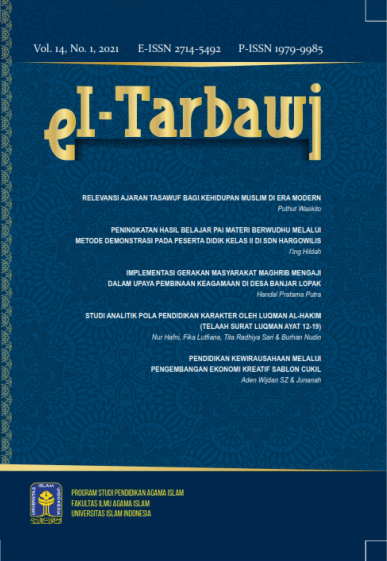Main Article Content
Abstract
Character education is a conscious effort to educate and empower students to
have individual characters, attitudes, and morals in accordance with social
norms so that they benefit themselves and society. In 2018, KPAI handled
1885 cases. The most cases, 504 children, are criminal cases starting from
drug dealers, stealing, to brawling. The KPAI also stated that the cases of
brawl in Indonesia increased by 1.1% throughout 2018. In 2017, the number of brawl cases was 12.9%, but increased to 14% in 2018. This shows that the problem of character is one of the problems that threaten the morality, attitudes and behavior of teenagers today. This Research is a narrative literature study through a descriptive approach as a method of writing. This studyfound that the humanist method with a gradual model is the main key to the success of implementing character education. The pattern of character education in Luqmanul Hakim's story begins with the role of parents in instilling tauhid belief, the teaching to do good to parents, worship, and instilling good and noble character in a child.
Keywords: Character Education, Role of Parents, Surah Luqman
Article Details
Copyright (c) 2021 EL TARBAWI

This work is licensed under a Creative Commons Attribution-ShareAlike 4.0 International License.
Authors retain copyright and grant the journal right of first publication with the work simultaneously licensed under a Creative Commons Attribution (CC-BY-SA) 4.0 License that allows others to share the work with an acknowledgment of the work’s authorship and initial publication in this journal.
References
- Abdurohim. 2020. “Pendidikan Karakter Luqman Al-Hakim”,
- Jurnal Pendidikan Karakter “JAWARA” (JPKJ), Volume 6,
- Nomor 01
- Berkowitz, Marvin W. and Melinda C. Bier. 2004. Research
- Based Character Education. The ANNALS of the
- American Academy of Political and Social Science 2004
- Force Academy and a professor of psychology at
- Marquette University.
- Lickona, Thomas. 1991. Educating for Character: How Our School
- Can Teach Respect and Responsibility. New York: Bantam
- Books
- Khaerudin. “penanaman pendidikan akhlak pada usia dini”
- https://www.neliti.com/publications/195097/penanamanpendidikan- aqidah-pada-anak-usia-dini, 12 september
- Mukodi. 2011. “Nilai-Nilai Pendidikan Dalam Surah Luqman”,
- Walisongo, Volume 19, Nomor 02
- Q-Anees, Bambang dan Adang Hambali. 2008. Pendidikan
- Karakter berbasis Al-Qur’an. Bandung: Simbiosa Rekatama.
- Syamsir. 2016. Pendidikan Karakter Ala Luqmanul Hakim,
- TINGKAP Vol. XII Nomor 1
- Suryabrata, Sumadi. 1998. Pengembangan Alat Ukur Psikologis.
- Jakarta: Dirjen Dikti Depdikbud.
- Susiba. 2018. “Pendidikan Aqidah Bagi Anak Usia Dini”,
- POTENSIA: Jurnal Kependidikan Islam, Vol. 4, Nomor
- Yuliharti. 2018. Pembentukan Karakter Islami Dalam Hadis
- Dan Implikasinya Pada Jalur Pendidikan Non Formal,
- POTENSIA: Jurnal Kependidikan Islam, Vol. 4, Nomor 02
References
Abdurohim. 2020. “Pendidikan Karakter Luqman Al-Hakim”,
Jurnal Pendidikan Karakter “JAWARA” (JPKJ), Volume 6,
Nomor 01
Berkowitz, Marvin W. and Melinda C. Bier. 2004. Research
Based Character Education. The ANNALS of the
American Academy of Political and Social Science 2004
Force Academy and a professor of psychology at
Marquette University.
Lickona, Thomas. 1991. Educating for Character: How Our School
Can Teach Respect and Responsibility. New York: Bantam
Books
Khaerudin. “penanaman pendidikan akhlak pada usia dini”
https://www.neliti.com/publications/195097/penanamanpendidikan- aqidah-pada-anak-usia-dini, 12 september
Mukodi. 2011. “Nilai-Nilai Pendidikan Dalam Surah Luqman”,
Walisongo, Volume 19, Nomor 02
Q-Anees, Bambang dan Adang Hambali. 2008. Pendidikan
Karakter berbasis Al-Qur’an. Bandung: Simbiosa Rekatama.
Syamsir. 2016. Pendidikan Karakter Ala Luqmanul Hakim,
TINGKAP Vol. XII Nomor 1
Suryabrata, Sumadi. 1998. Pengembangan Alat Ukur Psikologis.
Jakarta: Dirjen Dikti Depdikbud.
Susiba. 2018. “Pendidikan Aqidah Bagi Anak Usia Dini”,
POTENSIA: Jurnal Kependidikan Islam, Vol. 4, Nomor
Yuliharti. 2018. Pembentukan Karakter Islami Dalam Hadis
Dan Implikasinya Pada Jalur Pendidikan Non Formal,
POTENSIA: Jurnal Kependidikan Islam, Vol. 4, Nomor 02
